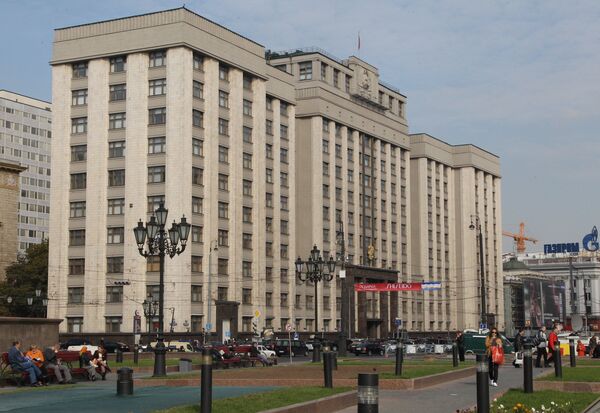MOSCOW, January 15 (RIA Novosti) – The State Duma, Russia’s lower house of parliament, kicked off its spring session Tuesday with promises to consider, within weeks, a raft of bills on everything from the return of independent candidates in legislative elections to bans on smoking and the “propaganda” of homosexuality.
The legislative body also gave preliminary approval to a bill requiring state bodies to enhance transparency by making extensive information available online.
Opposition lawmaker Ilya Ponomaryov, of the Just Russia party, told RIA Novosti after the vote that the bill’s passage in its initial first reading was “extremely important for civil society.”
Lawmakers batted down three different bills looking to replace Russia’s flat, 13-percent personal income tax with a progressive tax – a change President Vladimir Putin personally opposes. The legislature is set to consider a series of other amendments to the tax and administrative-offenses codes in the next several weeks.
Among the more high-profile bills that could make their way to the Duma floor in the next two months is a gradual ban on smoking in public places and tobacco advertisement in media.
Two more include legislation that would reintroduce an electoral system in which half the Duma’s 450 deputies could be elected as independent candidates unaffiliated with any party and legislation that would simplify the procedure for obtaining Russian citizenship.
Alexander Zhukov, the Duma’s first deputy speaker, said he believed that “in the near future – in January and February, at least – we will see the introduction of several more very important bills previewed in the president’s address,” given before high-level officials late last month.
At the time, Putin touched on a slew of political, social and economic issues, urging authorities to intensify the fight against smoking, promote “traditional values” and battle what he called the country’s “moral crisis,” largely through sports, education and youth policy.
Prior to Tuesday’s session opener, Russian media reported that deputies from the ruling United Russia party have been mulling some proposals with a xenophobic flavor. One possible piece of legislation would ban bureaucrats from driving foreign cars. Another would require that the children of Russian officials return to the country after receiving an education abroad.
A co-author of the latter proposal, United Russia deputy Vyacheslav Lysakov, told RIA Novosti on Tuesday that it is still under preliminary discussion.
In a move that earned scorn from critics, United Russia lawmaker Mikhail Starshinov said last week that a bill banning foreign citizens from working in Russian state-run broadcast media would be ready by the end of this week.
That legislation, aimed at preventing foreigners from “discrediting” Russia, seems to be aimed at Russian TV personality Vladimir Pozner, who holds Russian and US citizenship and came under fire after criticizing the Duma on air late last year.
Also controversial is an imminent Duma vote on a federal law banning “homosexual propaganda,” which was postponed in December until later this month.
Last year, the legislature stayed busy passing controversial rulings that critics have slammed as part of the Kremlin’s wider crackdown on dissent after Putin’s return to the presidency in May.
Mostly recently, the Duma angered Russians and foreigners alike after it voted to ban the adoption of Russian children by American citizens. Though one opinion poll found more than half of Russians approved of the ban, thousands came out to protest the move in downtown Moscow on January 13.
Some observers say the Duma, in which United Russia holds a 53 percent majority, will tailor its legislation in the coming months to the level of public discontent.
According to independent political analyst Pavel Salin, lawmakers will likely refrain from passing sensitive laws that risk "bringing people out onto the streets."
“The first couple of months will be relatively calm, or the Duma will pass laws that get widespread attention, but are mostly empty and don’t really affect most of the population,” he said.


